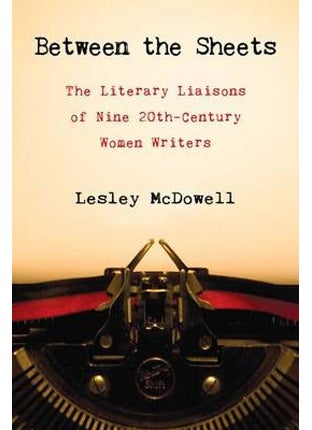Between the Sheets, By Lesley McDowell
Plath and Hughes, Sartre and Beauvoir: were these literary unions more equal than we'd thought?

Teachers take up with teachers, doctors with doctors and, of course, writers with writers. When people move in the same circles and share the same interests, it is inevitable that sexual liaisons and partnerships form. So it isn't remotely surprising that Lesley McDowell has found nine 20th-century examples of pairs of writers, from feisty Katherine Mansfield and feeble John Middleton Murry, to the deeply disturbed Sylvia Plath and the glittering Ted Hughes, and taking in pairs such as the loathsome Simone de Beauvoir and Jean-Paul Sartre and interesting examples such as Jean Rhys and Ford Maddox Ford along the way.
But her well-sustained argument attempts to turn received wisdom about these pairings on its head. The nine women she writes about have long been regarded, especially by feminist critics, as victims of the "exploitative" or even "suppressive" men – such as Ezra Pound, Ernest Hemingway and Henry Miller – they had affairs with or married.
Yet McDowell sees sexual attraction and admiration for each other's writing as part of the same generally constructive, not destructive, package. "What they all [nine pairs – 18 people] have in common is sexual desire and the desire to write," she says, asserting that, "Without those liaisons, the work of those extraordinary nine women writers, icons every one, would have been that much poorer."
Rebecca West, for example, had a famous 10-year affair with the older, married, unyielding HG Wells, by whom she had a son. Responsibility for a publicly denied illegitimate son meant, according to West's earlier biographers, that her career was more or less on hold for a decade. McDowell points out that, in fact, Wells encouraged her to complete what became an acclaimed biography of the recently deceased Henry James and to produce her first novel, The Return of the Soldier. She also wrote many reviews for prestigious magazines such as New Republic while she and Wells were lovers – which "doesn't really bear out the idea that Wells was bad for her". McDowell suggests instead that West's time with Wells was a valuable "literary apprenticeship".
The pioneering journalist Martha Gellhorn claimed for the rest of her life that marriage to the world-famous Ernest Hemingway had been a dreadful mistake, but McDowell points to Gellhorn's affectionate portrayal of him in Travels with Myself and Another. Although Gellhorn's career was well advanced before she met Hemingway (they were, effectively, a celebrity couple), it was his writing she fell in love with first. Then he encouraged her to come to Spain in 1938. Unsure about the technicalities of war, Gellhorn was advised by Hemingway to do what she had done previously in North Carolina and write about the effects of it on ordinary people's daily lives, thus giving birth to a new kind of journalism.
There are some misleading asides in McDowell's largely readable and thoughtful book. Why, for example, does she give the teenage learning of Shakespeare sonnets by heart as evidence of the "liberated" Elizabeth Smart's romantic view of sex? Odd too, in a book which spans the whole 20th century, to contrast these women who "believed they needed a writing partner" with modern counterparts who "have the vote and can own property". Most of the women in this book lived long after the enfranchisement of all women and, in the UK at least, the Married Women's Property Act dates back to 1882.
But these are minor quibbles about a book which takes a pleasingly fresh look at some relationships we think we already know all about – but actually, of course, do not. It is entertaining to learn, too, that the idea for it came from McDowell's own short relationship with a writer who fed her writing and boosted her professional self-confidence while exploiting her shamelessly in other ways. "If I didn't see myself as a victim, and I certainly didn't, why then should I see Elizabeth Smart as one?" she asks.
Join our commenting forum
Join thought-provoking conversations, follow other Independent readers and see their replies
Comments
Bookmark popover
Removed from bookmarks